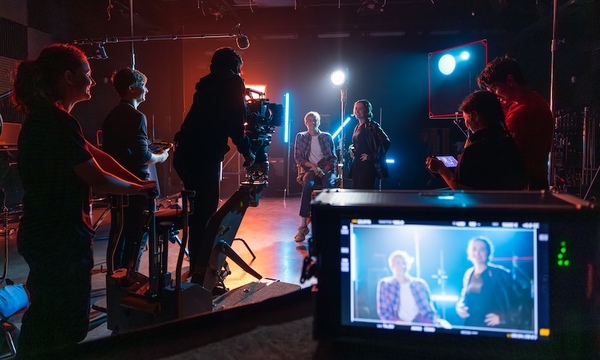Tribune Company newspapers like the Los Angeles Times and the Chicago Tribune reported how Biola’s Research Professor of Philosophy, William Lane Craig, debated and, arguably, trumped the 2010 Templeton Foundation prize laureate, Francisco J. Ayala, when recently debating the feasibility of Intelligent Design.
Ayala is a noteworthy UC-Irvine evolutionary geneticist and molecular biologist “who has vigorously opposed the entanglement of science and religion while also calling for mutual respect between the two,” noted the Templeton Foundation press release.
The annual Templeton Foundation prize seeks to honor “a living person who has made an exceptional contribution to affirming life’s spiritual dimension, whether through insight, discovery, or practical works.”
Ayala and Craig met last November at Indiana University to debate the question, “Is Intelligent Design Viable?” The debate was organized by Matthew Bazemore, an alumnus of Biola’s graduate program in Philosophy of Religion and Ethics, and moderated by Bradley Monton, a philosophy professor at the University of Colorado at Boulder and author of Seeking God in Science: An Atheist Defends Intelligent Design.
Despite Ayala having written a voluminous amount of work in the sciences compared to Craig, many self-identified atheist viewers of the debate felt that Craig won.
Craig went after the heart of Ayala’s guiding assumption: Darwinian Evolution. Since the question was not whether Intelligent Design was true but merely whether it was viable, Ayala just needed to disqualify Intelligent Design as a live option. And, indeed, Ayala attempted to do that scientifically and theologically.
“I had heard Ayala lecture on Intelligent Design last year [2008] in China and was dismayed by the caricatures and misrepresentations he gave to the Chinese students,” wrote Craig in a newsletter to supporters of his nonprofit, ReasonableFaith.org. “So even though I had never debated intelligent design in biology before, I decided to take on this debate to try at least to set the record straight.”
At the debate Craig argued that Ayala failed to disqualify Intelligent Design scientifically “because he couldn’t show that the Darwinian mechanisms are capable of producing the sort of biological complexity we see on earth,” said Craig.
Ayala also attempted to provide relevant theological arguments about how the “designer” in Intelligent Design was not all-powerful or all-good. But as Craig noted, these arguments were simply “irrelevant to drawing a design inference (however interesting and important they may be for theology) because the design argument doesn't aspire to show that the designer is all-powerful or all-good.”
But Ayala may not have expected the force of Craig’s argumentation. The Los Angeles Times reported that, “Ayala said he hadn't understood he would be debating and didn't believe a debate was the proper way to resolve the dispute anyway.” This was a complete surprise to Craig and the debate planners.
Nonetheless, a deeper problem for both Ayala and routine press coverage about Intelligent Design is the fundamental way in which the theory is inaccurately presented. Craig believed the article misrepresented what intelligent design theorists actually believed.
“I'm afraid the article merely perpetuated the caricatures of Intelligent Design that prevent serious engagement with its ideas on the part of evolutionary biologists like Prof. Ayala," said Craig.
A common way Intelligent Design is mischaracterized is by insisting that it is the result of religious faith or for the sake of bolstering religious faith.
“Knowledge has authority, but mere religious belief does not have authority,” notes Biola’s Distinguished Professor of Philosophy, J.P. Moreland. “Thus, if Intelligent Design can be viewed as some theory originating from religious belief and not as a source of knowledge about reality,” explained Moreland, “then in the relationship between science and religion, science’s authority will always trump religion or what is portrayed as ‘religious’ or ‘unscientific’ because it is thought that science, unlike religion, provides knowledge about reality; indeed on some views like Darwinian evolution, only science has ultimate knowledge about reality.”
The cultural realism of what Moreland observed was never truer when news broke about Ayala winning the prestigious Templeton Foundation prize. Even some scientists condemned the National Academy of Science (where the announcement was hosted) because of the appearance that the Academy had been associated with unscientific activity.
“When educational or cultural institutions are led by the prevailing idea that only scientific knowledge has real authority,” said Moreland. “Then when religion can be shown to have knowledge about reality, it’s as though the scientific establishment experiences a power crisis.”
You can learn more about the Intelligent Design movement by attending training events hosted by Biola’s Apologetics department on May 14 and 15 with leading experts like Stephen C. Meyer, William Dembski, John Bloom and several others. Biola offers unique on campus and Distance Learning graduate opportunities that converge around Intelligent Design, philosophy and theology of science and philosophy of religion, whether from our programs in Science and Religion, Christian Apologetics, or Philosophy of Religion.
Written by Joseph Gorra, Christian Apologetics. Jenna Bartlo, Media Relations Coordinator, can be reached at (562) 777-4061 or through email at jenna.l.bartlo@biola.edu.
 Biola University
Biola University
